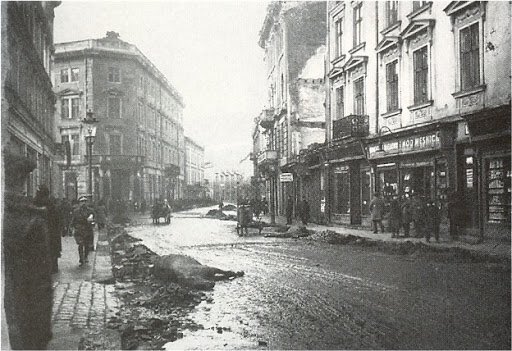
Yankee beetles – a thread of posters and other bits of propaganda from the Eastern Bloc published during the so-called 'war against the potato beetle' 

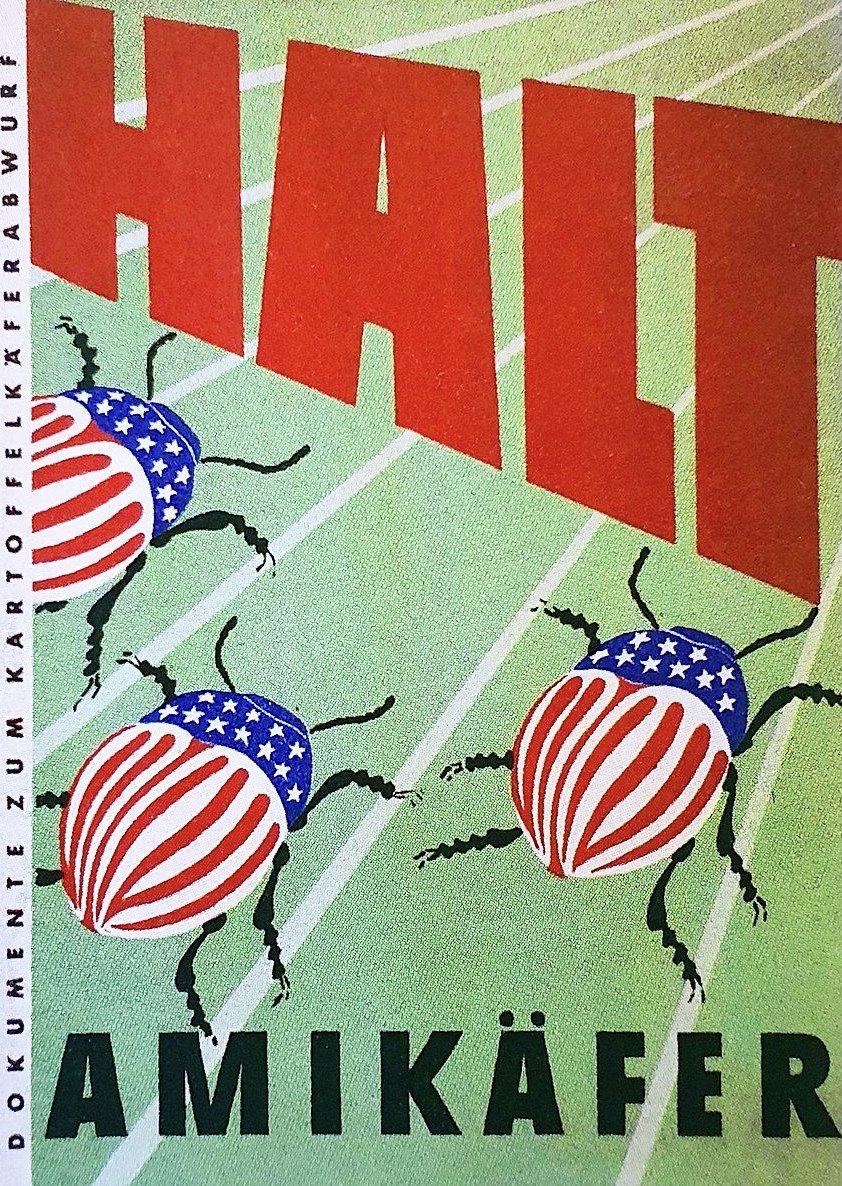

The Colorado potato beetle had first arrived in Europe in the mid-to-late nineteenth century. In the US it had been a well-known scourge of potato farmers since 1859. It began arriving in Europe in sizeable numbers following the First World War. 

A 1950 outbreak in the GDR prompted accusations of US-orchestrated sabotage, apparently stemming from Max Troeger, a farmer who claims to have seen US planes fly over his fields bbc.co.uk/news/magazine-…
"STOP Yankee beetles - documents on the Colorado beetle drop".
"STOP Yankee beetles - documents on the Colorado beetle drop".

The leaflet included Troeger's testimony and its publication was accompanied by a massive wave of propaganda – posters, radio broadcasts, pamphlets and other literature, including children's books - accusing the US of what amounted to biological warfare. 



"Workers and peasants, be vigilant!" – Poster (1950) showing striped and dollar-branded Colorado beetles rushing towards the GDR. "Saboteurs at work in service of the Americans!" 

A US plane drops Colorado beetles – "Yankee beetles would destroy our harvest. They also threaten your livelihood! Destroying the the potato beetles is fighting against the imperialists' war plans. Your fight against the ruinous plague from the USA is a fight for peace". 

Campaigns began throughout the Eastern Bloc, especially in Czechoslovakia and Poland. This Czechoslovak cartoon shows Truman with his general staff. Three of the soldiers are potato beetle-shaped. The book on the floor reads 'germ warfare' and Mein Kampf is on the table. 

Czechoslovak cartoon showing a U.S. General addressing a squadron of beetles: "The U.S. High Command gives you, the potato beetles, an honorary task: sabotaging agriculture and providing absolute leadership in "free enterprise". 

Czechoslovak cartoon showing Uncle Sam holding the flag, with the stars replaced by beetles – "A new symbol of American democracy". 
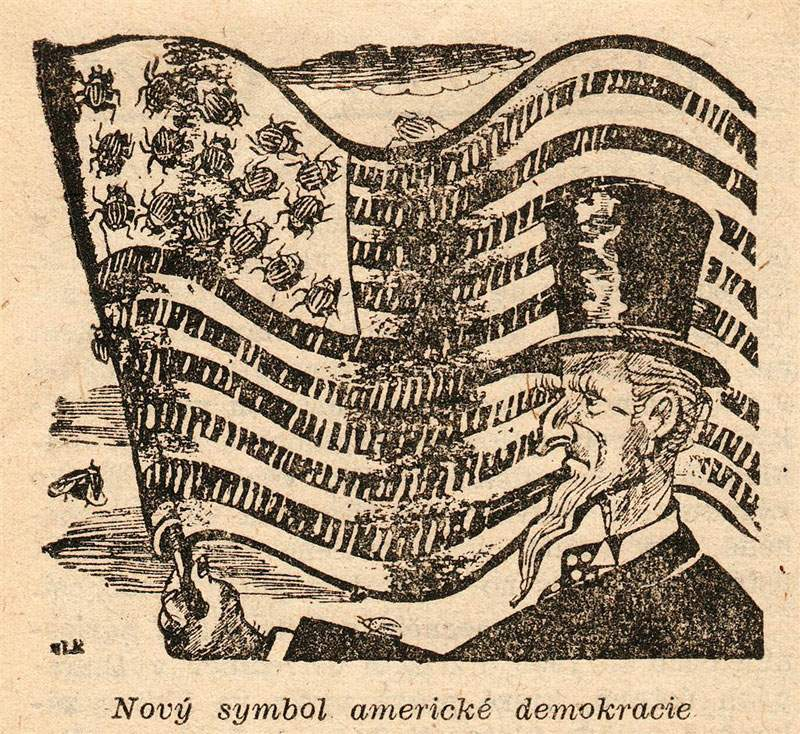
Czechoslovak cartoon showing a teacher demonstrating the "life cycle" of the potato beetle, from larval stage to "vesnický boháč" (roughly translating to something like 'kulak' I believe). 

Czechoslovak cartoon showing Truman dropping potato beetles over Czechoslovakia while dropping bombs over Korea – "The power of the people is greater than the criminal plans of the imperialists". 

Yet another from Czechoslovakia showing a red fist crushing the capitalist beetles. Drawn by Antonín Pelc, one of Czechoslovakia's more prominent artists and cartoonists. 

This one shows a "vesnický boháč" as a spider holding a money bag and scattering the beetle throughout farmland. He is dressed as a Sudeten German, with the typical "brush" in the hat and leather boots. 

Most of the Czechoslovak pieces were published in Porcupine (Dikobraz) magazine or the Mladá fronta newspaper.
Left – "How do we get to the countryside? We have been commissioned to spread Atlantic culture here..."

Left – "How do we get to the countryside? We have been commissioned to spread Atlantic culture here..."


"In the fight against the American beetle" – Czechoslovak poster with a skeletal American hand dropping the beetle over farmland. The text at the bottom reads: "How we fight the American beetle". 

Here's a Czechoslovak propaganda video denouncing the imperialist beetle:
Poland joined the war against the beetle, though seemed to have published considerably less (visual) propaganda. In this poster, the beetle (stonka) appears as a Jewish caricature atop a pile of money. The caption reads: "The Colorado beetle is your enemy". 

(Very little info on that previous poster, not sure if it was "official" propaganda or, to be honest, if it's even legit. Struggled to find a high res version too.)
"Assignment from the White House" – Soviet cartoon showing Truman shaking the hand (leg) of a Colorado beetle as he departs for Europe. Drawn by Boris Yefimov, one of the USSR's most famous political illustrators. 

The Soviet Union wasn't too badly affected by the Colorado beetle – at least not as badly as the countries to the West – though there were outbreaks towards the end of the 1950s, by which point the campaigns were beginning to wind down (becoming less belligerent towards the US). 

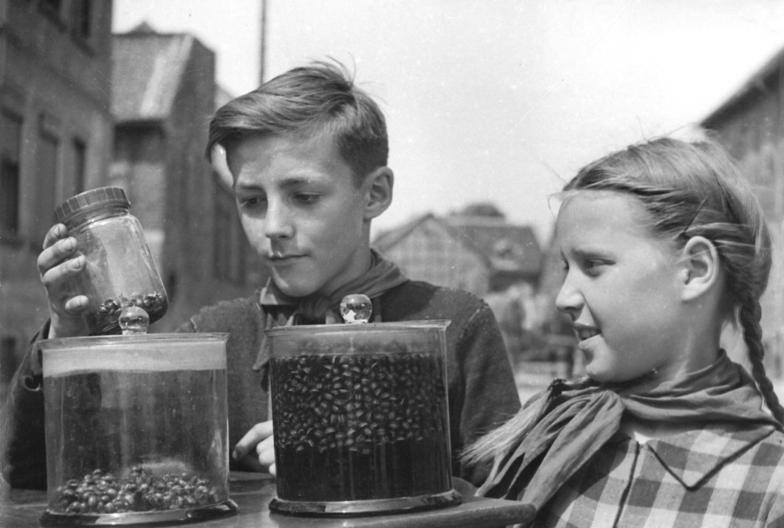
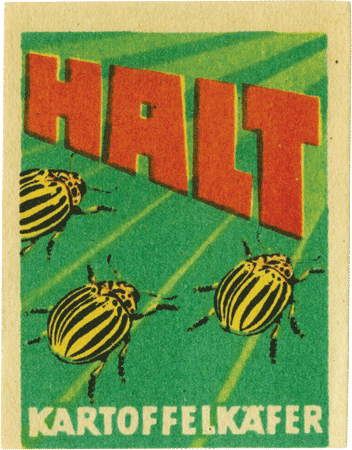
Interestingly, this wasn't the first time that the notion of a weaponised potato beetle had been proposed: during both world wars, France and Germany had seemingly researched and even tested the possibility of the potato beetle as a biological weapon sussex.ac.uk/Units/spru/hsp… 

And to close – an illustration (unfortunately awful quality) showing the Kaiser awarding the Iron Cross to a Colorado beetle. Presumably published around the First World War but could find zero information about it. 

• • •
Missing some Tweet in this thread? You can try to
force a refresh


















